The language studies of a 20-something American in Japan.
Don't wanna be here? Send us removal request.
Text

The art used for herbivore men in Bunpo made me laugh
2 notes
·
View notes
Text
i love the strange reality of being a human person with a human brain. one time someone said something to me in a foreign language (japanese, which i do not speak) and i automatically responded in a different foreign language (spanish, which i do not speak well) and then we both said "what?" in english, an experience made more surreal by the fact that everyone around us was speaking loudly in canadian french (as this occurred in Quebec)
56K notes
·
View notes
Text
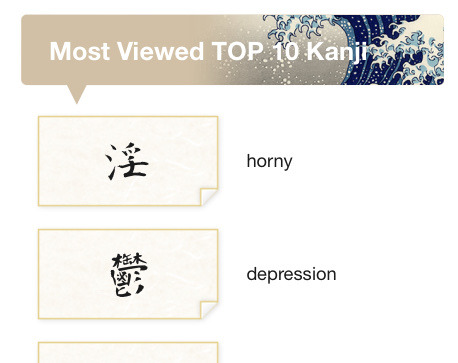
13K notes
·
View notes
Photo
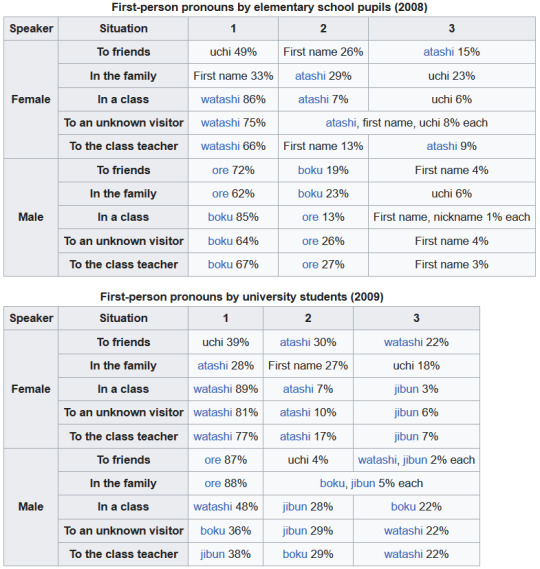
The thought of having to navigate this is very stressful to me
35K notes
·
View notes
Text
I started Hebrew, which is why I’ve been dead on this blog, but I don’t think I can ever properly convey to you guys the sheer cultural whiplash of spending years learning Japanese from Japanese teachers and then trying to learn Hebrew from an Israeli
Japanese: you walk into class already apologizing for being alive Hebrew: you walk into class, the teacher insults you and you are expected to insult her back
Japanese: conjugates every single verb based on degree of intended politeness, nevermind keigo and honorifics Hebrew: Someone asked my teacher how to say “excuse me” and she laughed for several seconds before saying we shouldn’t worry about remembering that since we’ll never need to say it
Japanese: if you get one stroke wrong the entire kanji is incomprehensible Hebrew: cursive? script? fuck it do whatever you want, you don’t even have to write the vowels out unless you feel like it
Japanese: the closest thing there is to ‘bastard’ is an excessively direct ‘you’ pronoun Hebrew: ‘bitch’ translates directly
260K notes
·
View notes
Photo
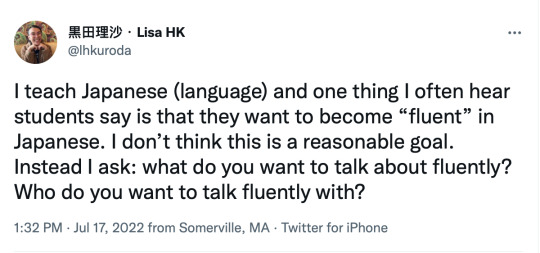
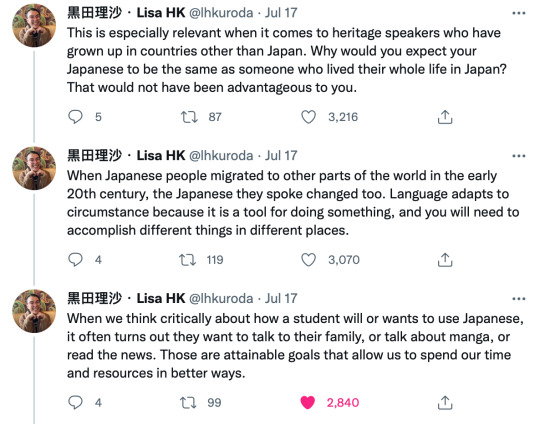
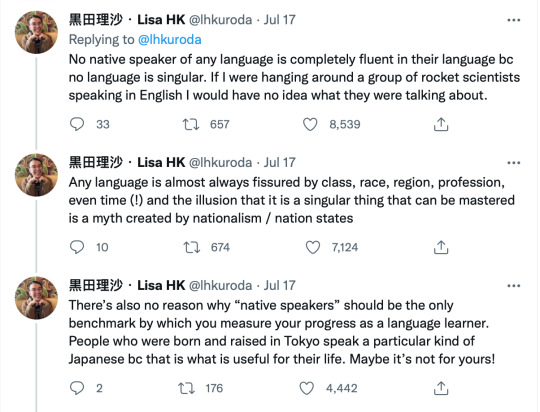
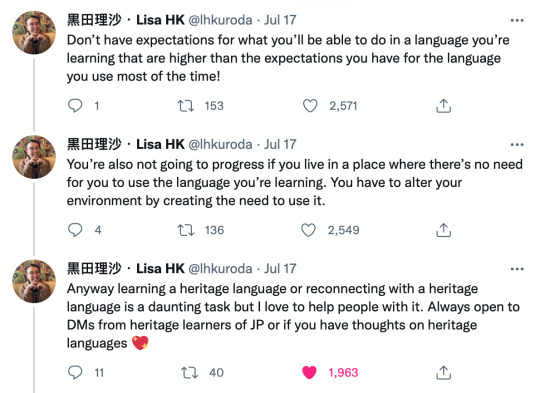
This Twitter thread really spoke to me. I wanted to share it with anyone who hasn’t seen it.
38K notes
·
View notes
Note
Does Japanese have a phrase similar to "toe beans" for cat toes? J-san has some lovely toe beans :)
にくきゅう!
にほんの 毛のない大きいねこも にくきゅうすき!
It's niku-kyuu(肉球) and Japanese also love them!
18K notes
·
View notes
Text

This is a post about masterposts about resources and books for studying many languages. I made this since many people do not know about all the resources that have been posted.
Resources for Many Languages: thelanguagecommunity
General
Language Library
Free Online Language Courses
Massive Language Resource
Language and Linguistics
Language Families/Groups
West African Languages
Classics Resource Masterpost
Latin & Greek Masterpost
Celtic Languages Resources
Celtic Family Masterpost
Dutch, Afrikaans, West Frisian, Limburgish
Finnish, Estonian, Saami, Voro
Germanic Languages Resources
Scandinavian Language Resources
North Germanic Languages
South Asian Languages Resources
Alien Languages of Star Trek
Afrikaans
Learn Afrikaans Masterpost
Afrikaans Resources
Ainu
Ainu Resources
Albanian
Albanian Resources
Arabic
Arabic Learning Resources
Arabic Language Resources
Arabic Language Apps
Moroccan Masterpost
Free Arabic Resources
Armenian
Armenian Language Masterpost
ASL
American Sign Language Masterpost
ASL Masterpost
Azerbaijani
Azerbaijani Resources
Belarusian
Belarusian Masterpost
Belarusian Resources
Bengali
Bengali Masterpost
Bosnian-Croatian-Serbian
Resources
Bulgarian
Bulgarian Resources
Catalan
Catalan Masterpost
Resources to Lean Catalan
Catalan Resources
Cantonese
Cantonese Resources
Mandarin Chinese
Mandarin Chinese Masterpost
Chinese Language Resources I
Chinese Language Resources II
Pinyin Masterpost
Intermediate Chinese Resources
Crimean Tatar
Crimean Tatar Resources
Czech
Czech Resources for Beginners
Czech Masterpost
Danish
Danish Masterpost
Dutch
Dutch Resources
Dutch Masterpost
English
English Online Courses
English Resource Masterpost
Euskera
Euskera Resources
Faroese
Faroese Resources
Finnish
Finnish Resources
Finnish Beginner Resources
Finnish Resources
French
French Resources
French Resource Masterpost
French Masterpost
Intermediate Resources
Galician
Galician Resources
Georgian
Georgian Language Masterpost
German
German Learning Tools
German Resources
German Resources
German Resources
German Sites
Gothic
Gothic Language Masterpost
Greek
Greek Masterpost
Ancient Greek Masterpost
Ancient Greek Resources
Greenlandic
Greenlandic Resources
Guarani
Guarani Masterpost
Hawaiian
Learn Hawaiian
Hebrew
Hebrew Language Masterpost
Hebrew Masterpost
Hindi
Hindi Language Masterpost
Hindi Audio & Video
Hungarian
Hungarian Masterpost
Hungarian Learning Resources
Hungarian Resources
Icelandic
Icelandic for Everyone
Icelandic Resources
Indonesian
Indonesian Resources
Italian
How to Learn Italian
Italian Resources
Italian Masterpost
Italian Resource Masterlist
Italian Culture Masterpost
Irish
Irish Resources
Japanese
Free Japanese Resources
Japanese Resources
Studying Japanese
Japanese Resource Masterpost
Japanese Language Learning Resources
Kannada
Kannada Resources
Kazakh
Kazakh Masterpost
Khmer
Khmer Language Masterpost
Kikongo
Free Kikongo Resources
Korean
Korean Textbook Masterpost
Korean Resources
Korean Resource Masterpost
Korean Language Masterpost
Ultimate Korean Masterpost
Kyrgyz
Kyrgyz Resources
Latin
Learning Latin
Masterpost of Latin Video Resources
Latin Resources
Malay
Malay Resources
Maltese
Maltese Resources
Mongolian
Mongolian Resources
Nahuatl
Nahuatl Language Masterpost
Nepali
Nepali Masterpost
Norwegian
Norwegian Masterpost
Norwegian Resources
Norwegian Sources
Norwegian Masteprost
Occitan
Occitan Resources
Old Church Slavonic
Resources
Pashto
Pashto Masterpost
Persian
Persian Language Masterpost
Polish
Polish Masterpost
Polish Self-Study Masterpost
Polish Resources
Portuguese
Portuguese Resources
Portuguese Resource Masterpost
Portuguese Starter Pack
Portuguese Resources
Punjabi
Punjabi Masterpost
Punjabi Resources
Romanian
Romanian Resources
Romanian Resources
Useful Romanian Resources
Romanian Masterpost
Romanian Resources
Russian
Russian Learning Tools
Russian Textbooks
Some More Resources
Russian Masterpost
Sami
Northern Sami Resources
Scottish Gaelic
Learn Scottish Gaelic Masterpost
Serbian
Serbian Masterpost
Language Resources
Sinhala
Sinhala Resources
Slovak
Slovak Resources
Slovak Masterpost
Slovene
Slovene Resources
Somali
Somali Language Masterpost
Spanish
Spanish Resources: Oxford
Spanish Resources
Learning Spanish
Spanish Resources Masterpost
Swahili
Swahili Resources
Swedish
Swedish Resources
Swedish Resources
Swedish Resources
Tagalog
Tagalog Masterpost
Tagalog Resources
Tamil
Tamil Resources
Tamil Masterpost
Tatar
Tatar Resources
Thai
Thai resources + books
Tibetan
Tibetan Resources
Turkish
Turkish Resources
Turkish Masterpost
Turkish Resource List
Ukrainian
Ukrainian Language Masterpost
Ukrainian Resources
Urdu
Urdu Masterpost
Vietnamese
Vietnamese Resources
Xhosa
Xhosa Resources
Yiddish
Yiddish Language Masterpost
Yoruba
Yoruba Resources
Zulu
Zulu Resources
**Last Updated: September 30, 2017**
21K notes
·
View notes
Text
fun thing i just remembered
in japanese, there’s a term for a person who dual wields swords called “ryoutoutsukai”, literally meaning something along the lines of “two sword user”. it’s ALSO a euphemism for bisexuality
127K notes
·
View notes
Text
Studying with Manga (my method, anyway)
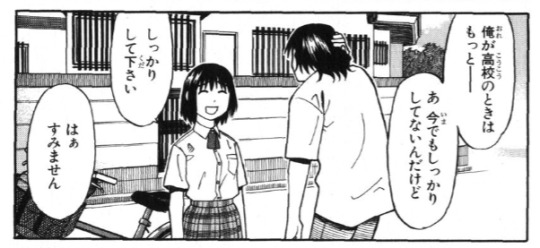
I only just recently started using manga as a study tool because honestly, it’s intimidating to crack open a book and realize just how little you actually know. I wish someone had told me earlier that it doesn’t have to be a terrifying jumble of grammar and kanji I haven’t learned yet, because it’s been a great tool! So I wanted to write a little guide for people who aren’t sure where to start, hopefully this helps someone!
Knowledge you’ll need: Ability to read hiragana & katakana, mid-beginner level grammar and vocab (if you find yourself struggling with every single speech bubble, maybe come back to this method later)
Some benefits to studying with manga:
★ You’ll get exposure to more casual and natural text than what you might find in a textbook
★ You’ll pick up a lot of genre-specific vocab
★ Illustrations make it easier to follow what’s going on based on context if you’re not quite sure about the text
★ It’s fun! And you absorb information better when you’re enjoying yourself :)
And some cons:
★ Speech might be more colloquial than you really want. Make sure you understand the context before you go repeating the dialogue
★ Said genre-specific vocab might not actually be useful, depending on the genre (I know SO MANY yu-gi-oh related words that I am NEVER going to need…)
★ Manga doesn’t care where you are in your textbook, so it’s on you to figure out the things you haven’t learned yet
Picking out a series
The main points to look for is that the language is relatively simple, the kanji has furigana attached and the genre is relevant to you (both because it won’t be very interesting otherwise, and because you’ll be picking up vocab as you go and it’s more useful if it’s vocab you can use in life). Yotsuba&!, Chi’s Sweet Home and Nichijou are some good examples. They can be purchased pretty easily on Amazon.co.jp for about $6 a volume. If you’re impatient it’s not particularly hard to find raw scans online, but please support the artist by buying the manga too :)
Let’s study!
I like to take it one chapter at a time and read each chapter 3-4 times, focusing on different things each time
First read: simply read through the chapter straight through- take your time to understand what you can and make notes of the pages where there’s something you’re unfamiliar with as you come across them, but don’t get hung up on them.
Second read: Go back to the trouble pages and look up any vocab and kanji you don’t know. Write them down along with their translation (if you do flashcards, add them to your deck for later review too!)
Third read: Go through one more time with your newfound vocab knowledge and see how much you can get this time. Look up any grammar you’re struggling with as you go along. Also, take any sentences you understand but had trouble with and add them to your flashcards as well (why & how you should study full sentences via flashcards)
Fourth read: if you have access to the English version of the manga, go through and compare your understanding to the official translation, see if you were wildly off anywhere and figure out why.
Go through each chapter like this and by the end of one volume you should have a ton of kanji and vocab to study, as well as a better understanding of how certain phrases are used and possibly some new grammar points! Neat! And hopefully you had a good time doing it, too :) this is a great way to make studying feel like less of a slog and break yourself out of you textbook comfort zone.
321 notes
·
View notes
Text
Work Smarter, Not Harder: study tips psychology taught me
study in shorter intervals and take breaks (ie, 40 minutes studying and 20 minutes break)
during your break don’t watch tv or surf the internet. get outside if you can and go for a walk. or at least listen to some instrumental music and walk around your hall. or meditate or do some art. anything that doesn’t require super directed attention. this allows your attention to be replenished. it’s like a muscle and you gotta give it time to rest. tv doesn’t allow for that.
relate the information to yourself and your life. creating visual images will improve your memory.
when studying, take notes by hand and put them in your own words. generating material yourself will encode the material better in your brain, and you’ll remember it better
don’t just reread, rehearse! quiz yourself on the materials. if you use a visual image “memory palace” technique, walk yourself through it. you’re likely to remember information you’ve tested yourself on better.
organizing information into groups that make sense create more connections in your brain and allow you to remember things better. the more meaningful connections you make, the better.
make sure the last thing you do before bed is study. no phone, no netflix. your brain will process what you’ve just done while you sleep and this improve recall.
(feel free to add any!)
27K notes
·
View notes
Photo

Got to class way too early AGAIN. Going over today’s lesson
5 notes
·
View notes
Text
Culture Shock in Japan Day 3
1. Crowds, crowds, crowds...I was waiting for a friend today but I couldn't find a place to stand still because there was just a constant people-wave. I ended up walking kinda far from the station just to find a place I could stop walking. 2. Huge lines for random things. Usually in America I see a line-out-the-door at a certain time, at certain exclusive places. Here McDonald's or some other such nothing-special takeout window will have a huge line at times I wouldn't expect. 3. Huge obsession with beauty here. We somewhat have it in America but here everywhere I look there's an ad for eye cream or a face mask or something. It makes me slightly uncomfortable. Which leads me to the next thing... 4. Over abundance of competing ads and businesses. In the subway especially, every tiny inch of space seems to have a different ad and then they have TVs on the train showing commercials as well. Ad overload. Also businesses (restaurants and shopping) are stacked and squished in an overwhelming way. I don't know where to look/go! 😱 5. Pachinko parlors are weird, epileptic gambling buildings that are usually blasting music and covered in anime characters for some reason. I might go in one once just out of curiosity 6. The face masks. I'm not weirded out by them, I think they're smart, but I didn't realize how abundant they'd be! It seems like 1/4 of people wear them! Sometimes I look around and think, "THIS many people are sick!?" Also, I saw and ad that was bragging that your lipstick won't rub off on your mask lol that's how commonplace they are. 7.Strange nose stuff. I saw 2 weird nose things: one on TV where they were saying "If you're nose is running and a co-worker comes over, hide it by drinking from your coffee mug!" (Or just blow your nose?) And then I saw an ad on the train where the photo was a girl flushing out her nose with some kind of cleanser. (Water streaming out of one nostril) I just thought "this would never work as an ad in America, unless it was a parody of something..." 8. I heard a loud knocking, looked out my window and saw someone using an old-timey rug beater. (I guess maybe we do that in America? I've never seen it though)
1 note
·
View note




